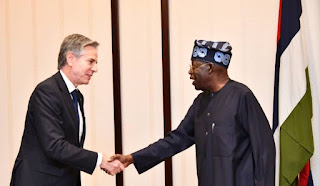U.S. Financial Assistance To West Africa: Altruism Or Neo-Colonialism?
 |
| Blinkin and Tinubu at the State House Abuja |
The recent pledge by U.S.
Secretary of State Antony Blinken to provide an additional $45 million in
financing to combat conflict and promote stability in coastal West Africa,
particularly Nigeria, has sparked discussions on the significance of the aid
and concerns about potential neo-colonial undertones.
While the financial assistance is
positioned as a measure to address rising insecurity linked to jihadist
insurgencies, fears linger that it may be part of a broader U.S. strategy to
exert influence over the governments of West Africa. It is therefore important
to examine the implications of the aid, its significance in addressing regional
instability, and the apprehensions surrounding neo-colonialism.
The pledge of $45 million signals
a commitment by the United States to address the increasing insecurity in
coastal West Africa, particularly in Nigeria, where jihadist insurgencies have
escalated in recent years. The funds are expected to bolster efforts to
counteract these security threats and promote stability in the region.
The financial aid has the
potential to have a significant humanitarian impact, addressing the needs of
populations affected by conflict and insecurity. This includes support for
internally displaced persons (IDPs), access to essential services, and
initiatives aimed at rebuilding communities devastated by violence.
Such financial commitments also
serve as a diplomatic tool, strengthening ties between the United States and
West African nations. By actively participating in addressing regional
challenges, the U.S. reinforces its diplomatic presence and fosters cooperative
relationships with key countries.
U.S. financial assistance
provides an opportunity for increased collaboration with international and
regional organizations. By working together, the global community can better
address complex security issues that transcend national borders and require a collective
response.
The pledge aligns with the
broader U.S. strategic interest in promoting stability and combating extremism
in regions that have strategic importance. Coastal West Africa is rich in
natural resources, and instability in the region could have implications for
global trade, making it an area of strategic concern for the United States.
Fears of neo-colonialism are
rooted in historical precedents where powerful nations exerted economic and
political influence over less-developed regions. Critics argue that foreign
aid, when tied to strategic interests, can perpetuate dependency and compromise
the sovereignty of recipient nations.
Concerns have been expressed that
U.S. financial assistance could be part of a broader strategy to influence and
control the governments of West African nations, including Nigeria. The aid, if
perceived as conditional or tied to specific policy outcomes, may raise
questions about the true nature of U.S. intentions. Some argue that extensive
financial aid can create economic dependency, making recipient countries vulnerable
to external pressures and interference. This dependency could undermine the
ability of these nations to pursue independent policies that best serve their
long-term interests.
The aid package's focus on
addressing insecurity raises concerns about potential military influence.
Critics fear that increased military assistance could lead to a situation where
the U.S. has a significant say in regional security strategies, potentially shaping
these nations' military policies to align with American interests.
Neo-colonial fears also extend to
concerns about resource exploitation. West Africa's natural resources,
including oil, make the region attractive to external powers. Skeptics worry
that aid could be a means to gain favorable access to these resources, possibly
perpetuating a pattern of economic exploitation.
To allay fears of
neo-colonialism, the United States must ensure transparent aid practices. Clear
communication about the objectives, terms, and conditions attached to the
financial assistance can build trust and demonstrate a genuine commitment to
the region's development.
The success of any aid initiative
lies in local ownership and involvement. The U.S. should prioritize working
with West African governments and organizations, ensuring that their
priorities, concerns, and perspectives are central to the aid's implementation.
U.S. aid should focus on
promoting economic empowerment rather than perpetuating dependency. Investments
in sustainable development, job creation, and capacity-building initiatives can
contribute to long-term stability and reduce vulnerability to external
pressures. Military assistance should be framed as cooperation rather than
control. The U.S. can collaborate with West African nations to enhance their
security capabilities while respecting their sovereignty and allowing them to
determine their own security strategies.
Establishing robust
accountability mechanisms and oversight for aid utilization is crucial. This
ensures that funds are directed towards their intended purposes, preventing any
misuse or diversion that could compromise the aid's positive impact.
The U.S. financial assistance to
combat conflict and promote stability in coastal West Africa, including
Nigeria, holds immense potential for positive change. However, fears of
neo-colonialism underscore the importance of transparency, local ownership, and
a genuine commitment to the long-term development and sovereignty of the
recipient nations. Striking a balance between addressing regional challenges
and respecting the autonomy of West African nations is essential to fostering a
constructive and mutually beneficial partnership.

Comments
Post a Comment